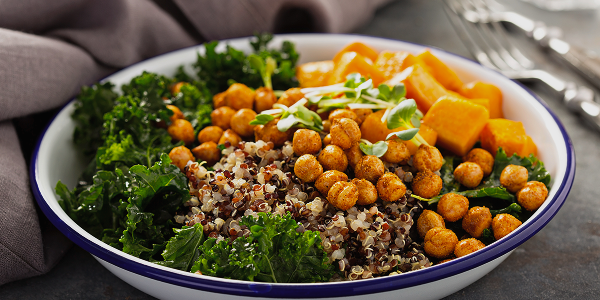
Irritable bowel syndrome (IBS) is a common gastrointestinal disorder, which affects the intestines. It affects about 10-15% of the population and commonly affects people who are 20-30 years old.
IBS can have a massive impact on one’s quality of life. Typical symptoms include abdominal pain, nausea, vomiting and changes in bowel habits – including diarrhoea and constipation. These symptoms can be triggered by stress, food sensitivities and hormonal changes and can occur at unpredictable times which can make it hard to plan things.
1: Low FODMAP Diet: The Gold Standard
FODMAP stands for fermentable oligosaccharides, disaccharides, monosaccharides and polyols – complex carbohydrates that are poorly absorbed in the small intestine. When these carbohydrates reach the colon, they ferment rapidly, produce gas and draws water into the bowel, which triggers the uncomfortable IBS symptoms.
Unlike other diets, the low-FODMAP diet is research-based, educational and temporary, helping you identify personal triggers while maintaining nutritional balance.
The diet operates in 3 phases:
- Elimination phase: 4-6 weeks of avoiding high-FODMAP foods. Foods to avoid include onions, garlic, wheat-based products, apples, beans and dairy products containing lactose.
- Reintroduction phase: systematically testing different FODMAP groups
- Personalisation phase: create your long-term eating plan
Equally, there are plenty of delicious, nutritional foods which are naturally low in FODMAPs. These include:
- Lean proteins like chicken, fish and eggs
- Vegetables like carrots, bell peppers, spinach and zucchini
- Fruits like strawberries, oranges, grapes and kiwi
- Grains: rice, quinoa and gluten-free oats
Working with a registered dietician ensures you navigate this process safely and at e-Surgery, we can help put you in contact with one of our registered dieticians.

2: Soluble Fibres are Your Friends
Not all fibre is created equal when it comes to IBS management. Understanding the difference between soluble and insoluble fibre can be a significant change for controlling your symptoms and improving digestive comfort.
Soluble fibre dissolves in water to form a gel-like substance that slows digestion and helps regulate bowel movements. This type of fibre is particularly beneficial for IBS sufferers because it can help firm up loose stools in patients, who suffer from diarrhoea while also softening hard stools for those with constipation. Soluble fibre also feeds beneficial gut bacteria, promoting a healthier microbiome.
Excellent sources of soluble fibre include oats and oat bran, barley, psyllium husk, chia seeds, flaxseeds, sweet potatoes, carrots, and citrus fruits. Beans and lentils are also rich in soluble fibre, though they may need to be introduced gradually due to their FODMAP content.
In contrast, insoluble fibre doesn’t dissolve in water and adds bulk to stool while speeding up transit time through the digestive system. While healthy for most people, it can be problematic for IBS sufferers, potentially triggering cramping, bloating, and diarrhoea by stimulating gut contractions.
Common sources of insoluble fibre to limit include wheat bran, whole grain cereals, nuts and seeds (in large quantities), raw vegetables with tough skins like tomatoes and peppers, and fibrous fruits like apples with peels.
Start by gradually increasing soluble fibre intake – begin with small amounts and slowly build up to allow your digestive system to adjust. This strategic approach to fibre management can significantly reduce IBS symptoms while supporting healthy digestion.

3: Identify and Eliminate Personal Trigger Foods
Beyond established dietary protocols, discovering your unique food triggers requires detective work and patience. Every person with IBS has a distinct set of problematic foods that may not align with standard guidelines, making personalised identification crucial for long-term symptom management.
The most effective tool for uncovering trigger foods is a comprehensive food and symptom diary. Track everything you eat and drink for at least two weeks, noting portion sizes, preparation methods, and timing. Record symptoms including their severity, duration, and timing relative to meals. Don’t forget to note stress levels, sleep quality, and menstrual cycles, as these factors can influence symptom patterns.
Look for consistent patterns rather than isolated incidents. A food that causes symptoms once might be coincidental, but if the same food triggers discomfort multiple times, it’s likely a genuine trigger. Pay attention to combination effects too – some foods may be tolerable alone but problematic when eaten together.
Once you’ve identified potential triggers, eliminate them completely for 2-3 weeks to allow your system to calm down. This elimination period should be strict – even small amounts can perpetuate inflammation and mask improvement. After the elimination period, reintroduce suspected triggers one at a time, waiting 3-4 days between each new food to clearly assess your body’s response.
Consider factors beyond the food itself: ripeness of fruits, cooking methods, meal timing, and portion sizes can all influence tolerance levels. What triggers symptoms at breakfast might be perfectly fine at dinner, and a small portion might be tolerable while a larger serving causes more problems.

4: Practice Mindful Eating: Timing and Portion Control is Everything
How you eat can be just as important as what you eat when managing IBS symptoms. Developing mindful eating habits and strategic meal timing can significantly reduce digestive distress and improve your body’s ability to process food effectively.
The pace at which you eat directly impacts digestion. Eating too quickly prevents proper chewing, which is the first step in breaking down food and signalling your digestive system to prepare appropriate enzymes. Chewing more often and at a slower pace allows your brain to register fullness signals, preventing overeating that can trigger symptoms. Eating too little or skipping meals can also provoke symptoms. Meal timing plays a crucial role in IBS management. Eating at consistent times helps regulate your digestive rhythm and prevents the feast-or-famine cycle that can worsen symptoms. Space meals 3-4 hours apart to allow proper digestion before introducing new food. Avoid eating within three hours of bedtime, as lying down too soon after eating can disrupt normal digestive processes.
Portion control is particularly important for IBS sufferers, as large meals can overwhelm the digestive system and trigger cramping or bloating. Consider eating smaller meals often throughout the day rather than three large ones. This approach maintains steady blood sugar levels and reduces the digestive burden at any single meal.
Create a calm eating environment by minimising distractions like television or smartphones. Stress hormones can interfere with digestion, so taking a few deep breaths before meals and eating in a relaxed setting can improve how your body processes food. Pay attention to hunger and fullness cues, stopping when you feel satisfied rather than completely full.

5: Hydration and Targeted Supplements
Proper hydration and strategic supplementation can provide additional support for managing IBS symptoms alongside dietary modifications. These complementary approaches help optimise digestive function and address specific nutrient gaps that may arise from dietary restrictions.
Hydration is fundamental for healthy digestion, yet many IBS sufferers unknowingly become dehydrated. Water helps soften stool, supports proper intestinal motility, and aids in nutrient absorption. Aim for 8-10 glasses of water daily, drinking between meals rather than with food to avoid diluting digestive enzymes. Room temperature or warm water is often better tolerated than ice-cold beverages, which can trigger cramping in sensitive individuals.
Be mindful of beverages that may worsen symptoms. Carbonated drinks can increase bloating and gas, while caffeinated beverages may stimulate bowel contractions and worsen diarrhoea. Alcohol can irritate the intestinal lining and disrupt gut bacteria balance.
Several targeted supplements have shown promise for IBS management. Probiotics containing specific strains like Bifidobacterium infantis or Lactobacillus plantarum can help restore beneficial gut bacteria, particularly after antibiotic use or during periods of high stress. Digestive enzymes taken before meals may help break down foods more effectively, reducing fermentation and gas production.
Peppermint oil capsules with enteric coating have demonstrated effectiveness in reducing IBS symptoms, particularly abdominal pain and bloating. L-glutamine supports intestinal lining repair, while magnesium can help with constipation-predominant IBS.
Always consult with a healthcare provider before starting new supplements, as they can interact with medications or may not be appropriate for everyone and quality matters. Start with one supplement at a time to assess individual tolerance and effectiveness. At e-Surgery, you can use our Ask-A-Pharmacist service to help you decide which supplements you want to use to support your gut heath.

Conclusion
In conclusion, managing IBS through dietary strategies requires patience, persistence, and a personalised approach. While the journey to identify your unique triggers and optimal eating patterns may seem overwhelming initially, remember that each step brings you closer to better digestive health and improved quality of life.
The strategies outlined in this guide work best when implemented gradually and consistently. Start with one or two approaches that resonate most with your current symptoms, then slowly incorporate additional techniques as you become more comfortable with the changes. Keep in mind that what works for others may not work for you – IBS management is highly individual.
Don’t hesitate to work with healthcare professionals, particularly registered dieticians who specialise in digestive health. Here at e-Surgery, we have a dietician service with highly trained dieticians. Just email [email protected] They can provide personalised guidance, ensure you’re meeting your nutritional needs, and help you navigate more complex dietary protocols safely.
Most importantly, be patient with yourself. Healing takes time, and setbacks are part of the process. With consistent effort and the right strategies, you can regain control over your symptoms and rediscover the joy of eating without fear.










